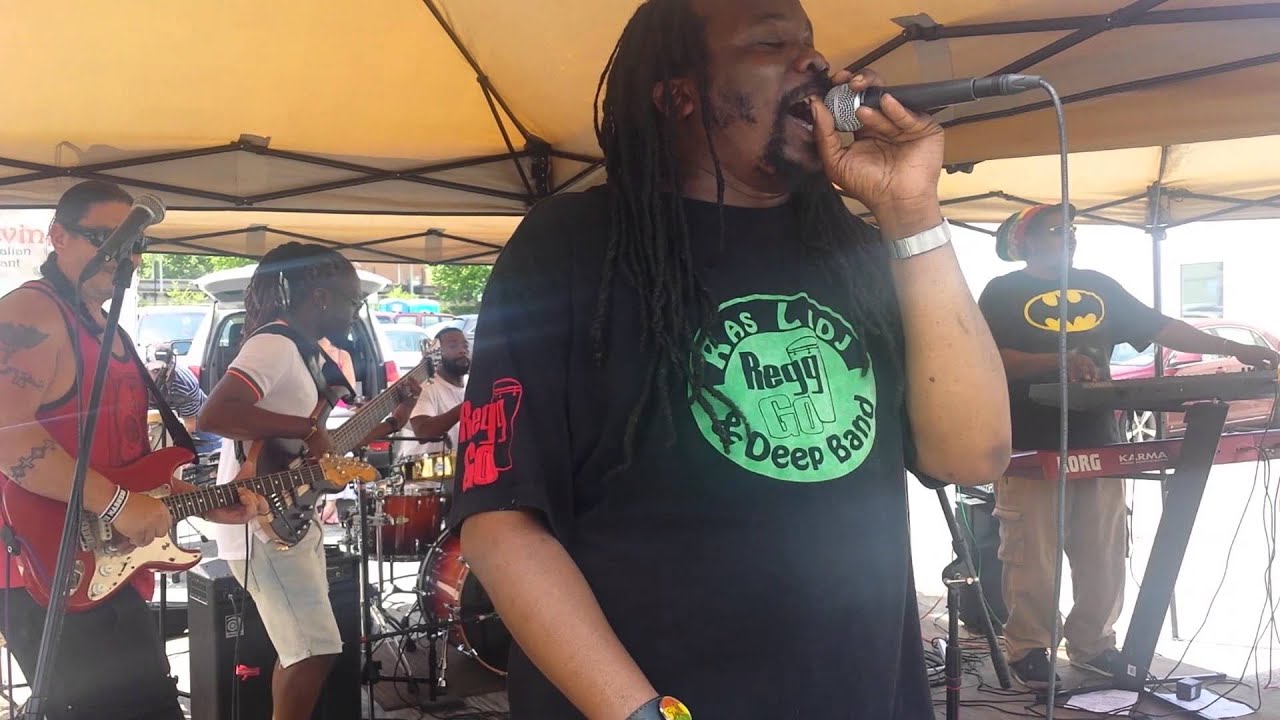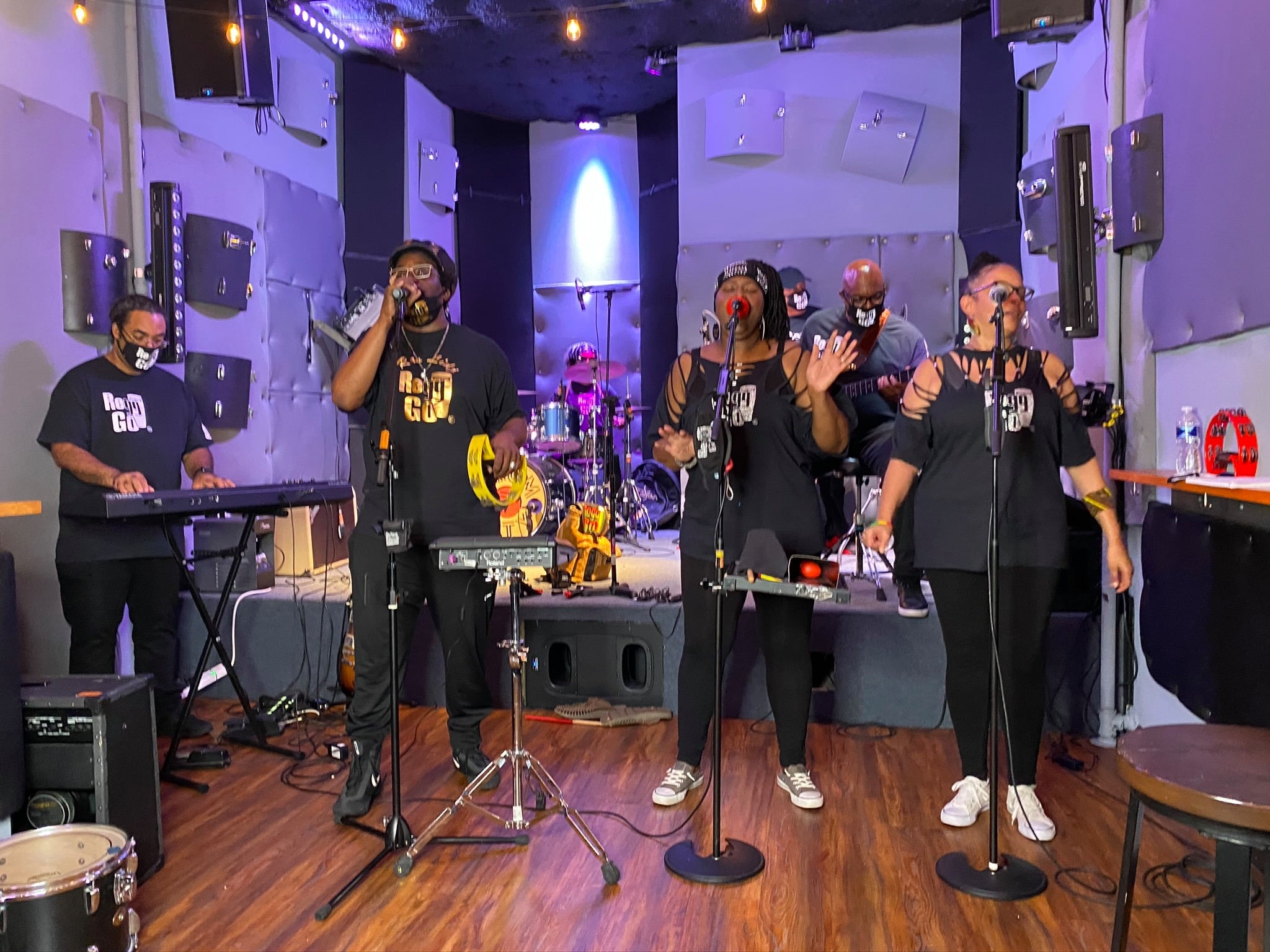 Hailing from Washington D.C., this next artist we had the privilege to interview, Ras Lidj, represents his area well. Blending the sounds of roots reggae and the go-go music that his hometown is known for, he has created his own infectious sound called Regg’Go. Ras Lidj has been a cornerstone in the reggae scene and a real veteran for years, helping promote artists and doing what it takes so Jah works can continue. It was great to sit down with him and hear about his musical journey.
Hailing from Washington D.C., this next artist we had the privilege to interview, Ras Lidj, represents his area well. Blending the sounds of roots reggae and the go-go music that his hometown is known for, he has created his own infectious sound called Regg’Go. Ras Lidj has been a cornerstone in the reggae scene and a real veteran for years, helping promote artists and doing what it takes so Jah works can continue. It was great to sit down with him and hear about his musical journey.
RF: What is your Backstory and how you came into music?
RL: I first would like to say thank you for this opportunity. It is good to be recognized, although it may not be often, especially in our own communities or particular regions where we reside. Hence, “unsung;” makes this one special and definitely a grateful opportunity, so give thanks.
I grew up at a very early age doing theatre. During my teen years playing in a go-go band was, I guess, my rebellion against my mother, because I did not want to do musical theatre anymore. She was persistent and bent on keeping me in the arts and out of the hood. The go-go band was ok with her after a while, I guess as a happy medium, because I was at least still on stage and performing. I also came to learn much later that my father was a singer, so microphone savvy must have been born in the genes.
RF: What are your early influences that inspired you?
RL: Definitely Stevie Wonder and Parliament Funkadelic. In D.C., Rare Essence original member Little Benny was my next-door neighbor, and this is the early days at the very start when go-go music was just breaking ground.
RF: How did you get into reggae music?
RL: Jah know, Jah movement and timing. Different times lead to reality. I first heard the music growing up in my house on records, Bob Marley, Yellow Man, and around my junior high school years, Musical Youth did Pass de Dutchie. My visit to Trinidad and Tobago in 1989, hearing the music blast on the mini-bus, especially the Clement Irie chune, “Bun and Cheese.” Coming home to a college party after and experiencing the dance floor totally transformed when the music changed from hip-hop to Rub-a-Dub. Around that same time, Shabba Ranks was just coming — he had not hit yet — but I was familiar with him and engulfed myself fully in reggae and dancehall culture while still being a member of my go-go band. Then, one night, my brother-in-law told me to meet him at a club in Northwest D.C., the Africa Room. Soul Defender Posee was playing there that night and featured a singer, Amha Baraka, who sang an original song, “Blood Money.” That song pierced my soul and changed some very dark energies in me. SEE – I was also performing. It was SEE-I, Roots and ZBo (R.I.P. Z), that night who put the mic in my hand as a dancehall dj for the very first time in a reggae performance. Of Course, all I had to chant and hype the crowd with was a Shabba cover! (Laughs.) Memories!
RF: What was the name of your first band and other early projects you were a part of?
RL: When you say first band, you have to be specific to say “stage” band, because the majority of us early stage artists here in D.C. and D.M.V. (Delaware/Maryland/Virginia) got our first band experience in high school marching band. In fact, I was the drum major at Ballou SHS. It is duly noted that this school is the backbone and the launchpad for the go-go music genre and many of its pioneering artists. Many of you know and have heard of the Junkyard Band. In the early days, every community or housing scheme tried to create their own Junkyard Band or band. So that’s where my first band experience came in. Then, I moved on to a band called Qwest Band — then hit the bigger stages when I became a member of Physical Wundors, performing weekly in many of the major go-go show venues and recording. Reggae music and Rastafari livity also entered my life musically during my time with this band, so I started chanting popular dancehall reggae hooks over the beat along with my rap parts in the show. Then, I got to start doing cameo mic appearances with other groups like Little Benny and The Masters and others.
RF: Talk a little about music, and what drives you to devote such a big part of your energy towards recording, and making albums, and traveling around playing this music for people?
RL: The simple answer to that is Rastafari way of life, doing Rastafari works and Marcus Garvey vibes energy that is the driving energy. Recording is why we can still talk, learn and get to know and understand about Marcus Garvey, Bob Marley, and all the greats before us. They wrote and it was recorded on paper, in books, on audio. When we do this, we are leaving a blueprint, a stamp, a print of who we are and what we represent. Traveling, the performance trips to Africa and Jamaica, were life changing experiences. Playing music for the people is our blessed gift given. Not all get this, so it is still the continuation of the work and a part of the process. The people want to keep hearing the message and seeing it live. That’s why, especially as writers and microphone artists, we must guide our tongue and watch our speech. The singers and players of instruments, we are the messengers. Living Rastafari TRUE work every day. It Is a way of life.
RF: Who are some of the artists you have helped produce?
RL: I would say I have invested in more than helped produce. Other artists, many younger and some my peers, have expressed verbally in their actions, dance or sound how they feel about or how much they appreciate and respect Regg’Go music and how I have been able to take two different genres of music, reggae and D.C. go-go, to create my own genre, something never done before. Bringing together two different cultural groups of people united musically. Go-go bands never really played reggae covers much before. Many have at least one in their set now and vice versa. Reggae or soca bands in and around D.C. and D.M.V. never business with go-go music at all much then. Now, the reggae and soca bands here will touch and play the beat a bit or a sound selecta will spin some go-go music a bit. I received a video the other day of a young child in Ghana, West Africa, looking at my video on her phone and singing along to my song “All to the East – Mama Africa.” Regg’Go Music is investing in the cultural consciousness and artistry expressions of the generations to come.
RF: What are some of the current projects you are working on?
RL: Regg’Go! Plain and simple, R-E-triple G-O — Regg’Go! Being blessed to be the innovator, creator and visionary of this Regg’Go music sound means having to see it all the way through fully. I often can only pray for the help and support so many others get, to encounter the right like-mind who also believes in Regg’Go and sees the vision and direction. Until then, I have to be the manager, band leader, song writer, executive producer, graphic designer, merchandise creator and seller, tech person whatever goes into having and maintaining a successful, full, eight-member band. I am involved in creating or making opportunities in every step of the process. The recent success of the Regg’Go remake of the classic “Fattie Bum Bum,” featuring Carl Malcolm, has me now going in the direction of finishing the complete album, Regg’Go Salutes the Reggae Greats. I won’t promise a release date, but it is fully in the works.
RF: What is your message to the people and younger bands inspired by reggae?
RL: What you put out is what you will get back. Humble yourself, stay humble. Practice, practice, practice. Practice not until you can play it right, but until you cannot play it wrong. The excitement, fanfair, groupies and after parties will come and always be there. Stay focused, continuously educate yourselves about your instruments and this business. Be prepared for your opportunity when it comes. Believe, and rest assured, it will. Time and chance happen to everyone. Remember to give back, support other artists and musicians. Real reggae music carries the message of upliftment, hope and love. That message is carried through the drum and bass, musical harmonies of the instruments and voices. What I mentioned above, what I have come to learn and know, is at the heartbeat drive of reggae music and all subgenres reggae music has created and inspired such as Ras Lidj’s Regg’Go Music.
